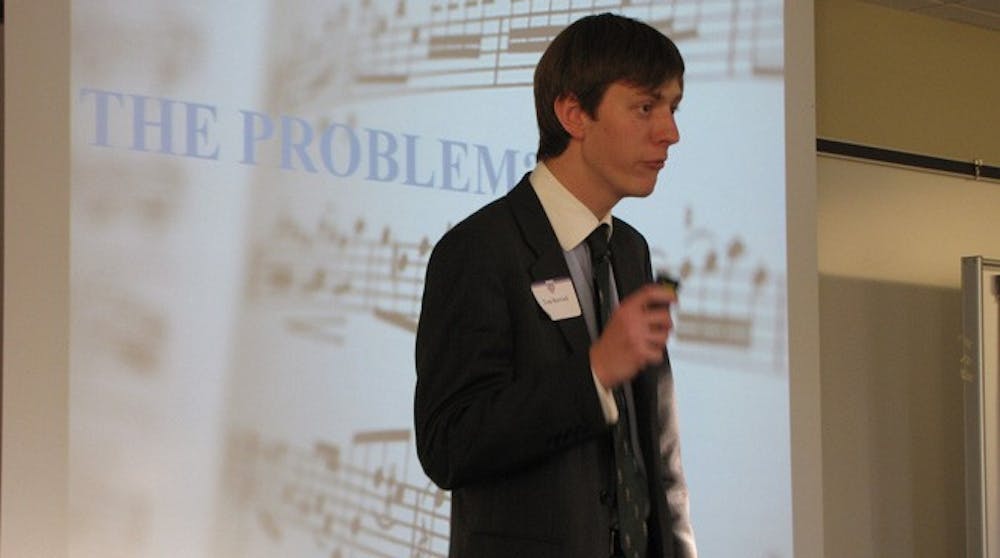A device that could transform the music industry, according to its creator, won first place and a $3,500 prize in the third annual UR Business Pitch Competition.
"It is the Rosetta Stone of learning how to play an instrument and the Kindle of sheet music," said senior Tom Borwick, creator of the VIVO.
The VIVO is a portable electronic device that can store and display sheet music, and listen, record and follow the musician as he or she plays an instrument, he said.
During Borwick's final round presentation to the panel of judges, senior Jessica Clough played violin while using a prototype model of the VIVO. Borwick said that the device is ideal for those learning or teaching music because of its ability to provide feedback to the musician through the recording, grading and sharing of music. Borwick said he had struggled to learn to play the bassoon and that the VIVO would have helped eliminate some of the problems he encountered.
At a cost of $300 per unit, Borwick said the VIVO would pay for itself after several uses, and was priced comparatively with the Apple iPad and Amazon Kindle.
"People can't afford the high cost of music lessons and the VIVO would allow people the rite of passage that is learning how to play a musical instrument," Borwick said. "It's an important part of growing up."
Professional musicians would benefit from the device because it eliminates the need to turn pages during a performance and frees them from the burden of photocopying books of music. The VIVO has the ability to store sheet music, which can be acquired for free if the material was produced before 1923.
Borwick said he needed a $600,000 investment to cover the first year of operations before he could generate a profit. He hopes to eventually have a patent and sell the product to a major manufacturer. He said he was still working with third parties to develop comprehensive technology that would critique all aspects of a musician's performance, beyond simply pitch.
During the past month, Borwick said he had spent an average of 40 hours per week working on his idea, receiving feedback from on-campus music ensembles, music store representatives and professional musicians.
"It's a relief to cross this hurdle, but I know that there is so much more work to do and I'm really excited about it," he said.
After the presentations, Borwick, along with seniors Connor McMahan and Max Prokell, was invited to present his idea to New Dominion Angels, a Virginia-based investor group, next week. Managing partner Mike McGinley, who was also a judge of the competition, said the students would have the opportunity to receive perspective and feedback from investors.
McMahan and Prokell, founders of Inteladex, won second place and a $1,000 prize for Smart Stacks, an index card system that combines colors and shapes to help a person learn and maintain information more effectively. They said that 95 percent of students use index cards to study, which would provide a market for their product.
Enjoy what you're reading?
Signup for our newsletter
"We found that students will pay up to $6 more for index cards that would work," McMahan said.
Consumers would purchase their index cards to use as a study tool because research has shown that certain colors and shapes have been scientifically proven to stimulate higher levels of brain activity, they said. McMahan and Prokell will be working with the university psychology department during the next few months to test the effectiveness of Smart Stacks.
Prokell also won third place and a $500 prize for The Office Hound, an online platform that would allow companies with vacant office space to connect with small business owners looking to rent space. Prokell owns the URL for the Web site, but needs investors, he said.
Other finalists included freshman Keefer Taylor for College Pages, a directory that would promote local businesses to college students, and seniors Paul Murad, Brad Robinson and Justin Schwartz for the Joe Jacket, a coffee sleeve that would include advertisements from local merchants. The finalists were pared down from an initial field of 28 teams, said Remo Kommnick, president of the entrepreneurship club.
One judge, Cindy Creasy Woolfolk -- the president and owner of James River Trade Exchange -- said that while each judge had his or her own grading criteria, the ideas were essentially judged based upon their present state, potential for growth and relevance, viability and whether or not they addressed a problem.
Contact staff writer Jimmy Young at jimmy.young@richmond.edu
Support independent student media
You can make a tax-deductible donation by clicking the button below, which takes you to our secure PayPal account. The page is set up to receive contributions in whatever amount you designate. We look forward to using the money we raise to further our mission of providing honest and accurate information to students, faculty, staff, alumni and others in the general public.
Donate Now



